The media may have ignored it but Labour Deputy David Parker’s speech at the Cashmere Club last week was well worth a listen. In that speech, Parker delivered a clear message to farmers. Degradation of water quality in New Zealand’s streams, rivers and lakes is not an acceptable consequence of agricultural expansion.
Articulating aspirations I suspect many New Zealanders share, Parker spelt out Labour’s objectives: “streams, rivers, lakes and beaches.. [that are] swimmable, fishable and safe for food gathering.” Clarifying the commitment even further, Parker explained that “clean rivers and lakes will not be allowed to get dirty, dirty rivers and lakes will be cleaned up over a generation.”
It’s a breath of fresh air to hear environmental goals expressed so clearly. It is in contrast to the confusing commitments embedded in the fresh water policies we have at the moment. In 2011 the current government released the National Policy Statement for Freshwater (NPS) and supplemented this in 2013 with the National Objectives Framework (NOF).
The National Policy Statement articulates two goals. One is to “safeguard the life-supporting capacity” of fresh-water. The other is to “maintain or improve” the “overall quality of fresh water within a region.” There is an ambiguity with this – why qualify the commitment to maintain or improve the quality of water by saying it relates to water “within a region”? Does that mean some streams and rivers will be allowed to get worse as long as others elsewhere in the region improve (so overall by volume, for example, the region’s water doesn’t get any worse?). The only unequivocal commitment to protecting an individual stream, river or lake happens when the waterway is “outstanding”. But there is no clarification of what is meant by “outstanding” nor any light shed on who gets to decide.
Parker’s speech offers something firmer: no individual waterway will be allowed to get worse. There will be no retreat on water quality from now on.
The architects of Labour’s environmental policy seem to be aware of criticisms of the NOF too. The NOF articulates what is meant by water quality, lists the scientific variables that will be used to monitor water quality, and creates water quality ‘labels’ or bands based on the values of these variables. If the scientific variables are monitored and show a water way is in ‘Band D’ the condition of the water is said to be unacceptable. Band D definitions are widely referred to as environmental “bottom lines”. The implication is that regional councils (who have the legislative responsibility to manage water quality) must not allow water quality in Band D water ways to deteriorate any further (although, of course, we don’t know for sure whether this obligation relates to an individual water way or to all water “within a region”).
Parker highlighted weakness in the NOF relating to estuaries – these are omitted from the current NOF so there is currently no way of knowing what the ‘bottom line’ is for water quality in an estuary. He also pointed to risks implicit in the bottom lines, in some cases these are set “just short of levels that are toxic to aquatic life”.
It is important to put the NPS and NOF in perspective. They are first steps on a long path to deliberate management of freshwater. It is not ideal but probably understandable that the NOF is as yet incomplete. However failing to clearly articulate over-arching goals is a serious and avoidable problem with the NPS, and Labour is right to highlight it.
Is the ambiguity in the NWPS accidental or deliberate? Who knows, but ambiguity like this works in favour of those who wish to push back on environmental protection. Just the possibility that some water ways can be sacrificed (providing there are offsets elsewhere) creates a whole new area of debate that an unambiguous commitment would have closed down. Debate, as any well organized interest group will tell you, is a very effective way to delay change. While the specifics of what Labour would do to deliver on its commitments are not clear, recognizing the need to remove ambiguity is a welcome contribution.

